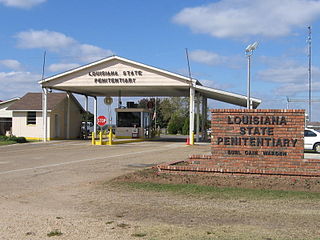Life imprisonment is any sentence of imprisonment for a crime under which the convicted criminal is to remain in prison for the rest of their natural life. Crimes that result in life imprisonment are considered extremely serious and usually violent. Examples of these crimes are murder, torture, terrorism, child abuse resulting in death, rape, espionage, treason, illegal drug trade, human trafficking, severe fraud and financial crimes, aggravated property damage, arson, hate crime, kidnapping, burglary, robbery, theft, piracy, aircraft hijacking, and genocide.

Measure 11, also known as "One Strike You're Out", was a citizens' initiative passed in 1994 in the U.S. State of Oregon. This statutory enactment established mandatory minimum sentencing for several crimes. The measure was approved in the November 8, 1994 general election with 788,695 votes in favor, and 412,816 votes against.
Probation in criminal law is a period of supervision over an offender, ordered by the court often in lieu of incarceration. In some jurisdictions, the term probation applies only to community sentences, such as suspended sentences. In others, probation also includes supervision of those conditionally released from prison on parole. An offender on probation is ordered to follow certain conditions set forth by the court, often under the supervision of a probation officer. During the period of probation, an offender faces the threat of being incarcerated if found breaking the rules set by the court or probation officer.

Capital punishment is a legal penalty in the U.S. state of Louisiana.
In the United States, habitual offender laws have been implemented since at least 1952, and are part of the United States Justice Department's Anti-Violence Strategy. These laws require a person who is convicted of an offense and who has one or two other previous serious convictions to serve a mandatory life sentence in prison, with or without parole depending on the jurisdiction. The purpose of the laws is to drastically increase the punishment of those who continue to commit offenses after being convicted of one or two serious crimes.

Incarceration in the United States is one of the primary means of punishment for crime in the United States. In 2021, over five million people were under supervision by the criminal justice system, with nearly two million people incarcerated in state or federal prisons and local jails. The United States has the largest known prison population in the world. It has 5% of the world’s population while having 20% of the world’s incarcerated persons. China, with more than four times more inhabitants, has fewer persons in prison. Prison populations grew dramatically beginning in the 1970s, but began a decline around 2009, dropping 25% by year-end 2021.

The Federal Bureau of Prisons (BOP) is an agency of the United States Department of Justice that is responsible for all federal prisons in the country and provides for the care, custody, and control of federal prisoners.

Delara Darabi was an Iranian Gilaki woman who was sentenced to death after having been convicted of murdering her father's female cousin in 2003. Although Delara initially claimed that she had committed the crime, she subsequently recanted and explained that her older boyfriend, Amir Hossein, had persuaded her to lie about the incident to protect him. According to Delara and other sources familiar with the case, Amir Hossein was the person who had committed the murder in an attempt to steal from a wealthy member of the Darabi family. She was hanged in Rasht Prison on 1 May 2009.

Incapacitation in the context of criminal sentencing philosophy is one of the functions of punishment. It involves capital punishment, sending an offender to prison, or possibly restricting their freedom in the community, to protect society and prevent that person from committing further crimes. Incarceration, as the primary mechanism for incapacitation, is also used as to try to deter future offending.
In the United States, life imprisonment is the most severe punishment provided by law in states with no valid capital punishment statute, and second-most in those with a valid statute. According to a 2013 study, one of every 2,000 prison inhabitants of the U.S. were imprisoned for life as of 2012.

In the United States, sentencing law varies by jurisdiction. The jurisdictions in the US legal system are federal, state, regional, and county. Each jurisdictional entity has governmental bodies that create common, statutory, and regulatory law, although some legal issues are handled more often at the federal level, while other issues are the domain of the states. Civil rights, immigration, interstate commerce, and constitutional issues are subject to federal jurisdiction. Issues such as domestic relations, which includes domestic violence; marriage and divorce; corporations; property; contracts; and criminal laws are generally governed by states, unless there is federal preemption.

The United States incarcerates more of its youth than any other country in the world, through the juvenile courts and the adult criminal justice system, which reflects the larger trends in incarceration practices in the United States. In 2010, approximately 70,800 juveniles were incarcerated in youth detention facilities alone. As of 2006, approximately 500,000 youth were brought to detention centers in a given year. This data does not reflect juveniles tried as adults. As of 2013, around 40% were incarcerated in privatized, for-profit facilities.
Graham v. Florida, 560 U.S. 48 (2010), was a decision by the Supreme Court of the United States holding that juvenile offenders cannot be sentenced to life imprisonment without parole for non-homicide offenses.
Incarceration is one of the criminal punishments in Ukraine provided for in the Criminal Code of Ukraine.
Miller v. Alabama, 567 U.S. 460 (2012), was a United States Supreme Court case in which the Court held that mandatory sentences of life without the possibility of parole are unconstitutional for juvenile offenders. The ruling applied even to those persons who had committed murder as a juvenile, extending beyond Graham v. Florida (2010), which had ruled juvenile life without parole sentences unconstitutional for crimes excluding murder.
In the United States, a seven-deadly-sins law for juvenile offenders is a law intended to address the increasing rates of violent crime among youth. The law has taken many forms in different state legislatures in the United States. However, the "seven deadly sins" aspect always refers to the jurisdiction of the superior court over the trial of any juvenile 13–17 years old who allegedly committed murder, rape, armed robbery with firearm, aggravated child molestation, aggravated sodomy, aggravated sexual battery, or voluntary manslaughter. In the mid 1990s, numerous US states enacted seven-deadly-sins laws to combat so-called teen "superpredators," a predicted wave of remorseless teenaged criminals. However, this prediction did not come to fruition.

Proposition 47, also known by its ballot title Criminal Sentences. Misdemeanor Penalties. Initiative Statute, was a referendum passed by voters in the state of California on November 4, 2014. The measure was also referred to by its supporters as the Safe Neighborhoods and Schools Act. It recategorized some nonviolent offenses as misdemeanors, rather than felonies, as they had previously been categorized.

Criminal justice reform seeks to address structural issues in criminal justice systems such as racial profiling, police brutality, overcriminalization, mass incarceration, and recidivism. Reforms can take place at any point where the criminal justice system intervenes in citizens’ lives, including lawmaking, policing, sentencing and incarceration. Criminal justice reform can also address the collateral consequences of conviction, including disenfranchisement or lack of access to housing or employment, that may restrict the rights of individuals with criminal records.

Norway's criminal justice system focuses on the principles of restorative justice and the rehabilitation of prisoners. Correctional facilities in Norway focus on maintaining custody of the offender and attempting to make them functioning members of society. Norway's prison system is renowned as one of the most effective and humane in the world.
The superpredator or super-predator is a type of criminal in a now-debunked criminological theory that became popular in the 1990s in the United States, which posited that a small but significant and increasing population of impulsive youth were willing to commit violent crimes without remorse. Criminologist and political scientist John J. DiIulio Jr., theorized that superpredators were a growing phenomenon and predicted a large increase in youth crime and violence as a result. The idea of superpredators contributed to a moral panic about juvenile crime. Proponents warned of "a blood bath of violence" or "Lord of the Flies on a massive scale". American lawmakers seized on this idea, and implemented tough-on-crime legislation for juvenile offenders across the country, including life without parole sentences.










